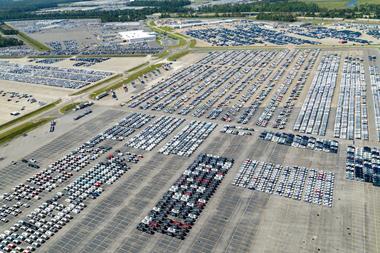 A number of players in the Russian automotive sector are beginning to report an easing in the additional customs restrictions that have been used to target parts imports from Turkey since two of its F-16 fighters shot down a Russian Su-24M bomber near the Syrian border late last year.
A number of players in the Russian automotive sector are beginning to report an easing in the additional customs restrictions that have been used to target parts imports from Turkey since two of its F-16 fighters shot down a Russian Su-24M bomber near the Syrian border late last year.
In the weeks immediately after the incident, Russian customs officials began insisting on containers from Turkey being completely unpacked for clearance, frequently finding grounds on which to prevent them from completing their journey. Officials in St Petersburg appealed against this unofficial ban on the behalf of anxious carmakers but the problems persisted for many.
Though the sanctions imposed on Turkey in the aftermath of the incident were lifted by Russia earlier this year, problems at border crossings appear to have remained in many cases. As recently as late June, delegates at this year’s Automotive Logistics Russia summit in Moscow were still reporting difficulties in importing critical components.
The situation has caused serious disruption to supply chains and, according to Alexander Kovalenko, national customs manager at Gefco Russia, resulted in a rise in the cost of logistics services for importers.
“After the infamous incident, additional control measures on goods of Turkish origin were introduced, meaning basically 100% inspection of goods that included recalculation, weighing and sampling,” said Kovalenko. “The measures significantly complicated the import of automotive parts and components made in Turkey. In addition, importers had to bear significant additional costs for handling operations, storage, weighing, and so on.”
Kovalenko confirmed the situation had now begun to ease, however. “Just two weeks later, the additional control measures for products destined for Russia began to decrease,” he said.
The situation has taken longer to resolve for other parts of the automotive sector, however, said Marina Stepina, a spokeswoman for PSMA Rus – the joint venture between PSA Group and Mitsubishi in Russia. While customs clearance times for imported components of Turkish origin for vehicle production at PSMA Rus’s plant had improved from January, she agreed, aftermarket parts, in particular, had continued to suffer delays.
“PSA Group imports Turkish aftermarket parts into Russia and for those, the situation with customs clearance times has been a lot different,” she confirmed. Stepina added, however, that even on this score there had been some recent improvement.
Not all carmakers have had problems with imports from Turkey, however. Glovis Rus, for example, said it had experienced no complications with the import of Hyundai and Kia parts for retail.
“Recent developments in Russian-Turkish relations led to changes in the area of the tourist industry [only], so we did not feel a significant difference,” said Sevda Murtilova, head of the customs clearance department at Glovis Rus. “We are not experiencing any difficulties with the registration of Turkish goods,” he continued, adding that checks were only being carried out in the proper manner as stipulated by the Russian Federal Customs Service.
That was backed up by Sergei Nabokov, a spokesman for the Russian Federal Customs Service, who stressed that by the end of last year, customs clearance of Turkish goods was being carried out strictly in accordance with the legislation, both in terms of the time taken and the measures applied to inbound shipments.
Redirected shipmentsAt the beginning of the conflict, Russian officials began urging carmakers to cease imports from Turkey and look for alternative markets intead.
In January, Russia’s deputy prime minister Dmitry Rogosin said Russia was considering shifting component sourcing to Serbia. According to him, domestic producers Avtovaz and Kamaz would be leading the new approach which, he suggested, would bring significant profits to Serbia’s automotive sector. Rogosin failed to say, however, whether this would impact logistics costs in any way for carmakers and neither Avtovaz nor Kamaz has commented on that issue.
For most carmakers, it was not possible to shift to alternative suppliers and instead, to avoid further delays, many started to redirect their shipments via other members of the Eurasia Economic Union with whom Russia has an open border policy.
“One client, who has almost 40% of its business made up of goods from Turkey, was forced to redirect import flows to the Republic of Belarus, where there are no such restrictions [at the border],” confirmed Kovalenko. This approach, he said, meant Turkish goods were still finding their way into the Russian market but with an increase in journey times and costs that could only lead to a price hike for consumers.
Another market observer, who preferred to not be named, said his company was refraining from redirecting shipments in this way, however.
“A lot of things depend on the attitude of individual customs officers,” he observed. “We have been importing large numbers of components via a particular customs station in St Petersburg for many years and have a good history there, so we manage to get our goods in from Turkey without certain complications. We have declined to use alternative routes because even if they are potentially cheaper, we cannot predict how customs officers might act in another place.”
Now that the respective presidents of the two countries appear to have settled their differences, carmakers and tier suppliers in both nations will be hoping to have seen the last of such problems.





















